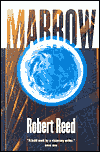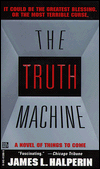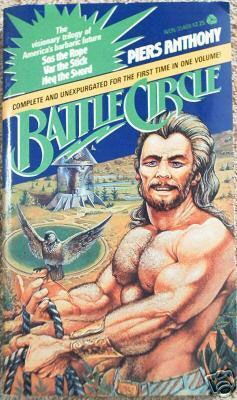
Marrow, by Robert Reed
Book Review by Jonathan M. Sullivan
Marrow seems to transcend all that. There are a hundred human cruelties to be found in this sweeping epic, to be sure. But Marrow is a story packed with mythological resonance, about humanity finding the Evil at the Core, wrestling with it, nearly succumbing to it, seeing it for what it is, and ultimately transcending it. Maybe.
The story isn't that complicated. Perhaps a millennium from now, humans discover an unimaginably huge starship entering the Milky Way from the great void. It is uninhabited, but well suited to humanoid colonization. A brief war is fought with other species for ownership of the derelict, and humans emerge victorious. But what to do with the object? The Master Captain decides to take the Ship on a great journey, circumnavigating the Milky Way, picking up passengers from a billion species along the way. And all the while the ship will be run by the Master Captain and her virtually immortal, almost indestructible human captains.
All goes swimmingly for several millennia, and then a fantastic discovery is made. At the heart of the Ship, long assumed to be solid iron, lies an entire planet, a hellish world of tectonic violence and weird life forms: Marrow. A cadre of elite captains are sent down to explore this world, braving toxic fumes, unpredictable quakes, and sudden floods of molten iron.
They suddenly find themselves cut off by a terrible cataclysm, and left for dead. Over the next several millennia they rebuild a civilization on Marrow, and plan their return to the Ship. For the marooned captains and most of their offspring, this is the focus of all their efforts, an almost holy crusade. But for some of their descendants, it is an abomination. This is more than just an empty argument, for Marrow is expanding, and within a few millennia it will fill enough of the Ship's hidden heart to make return a possibility.
And so Reed plants the seeds of a colossal conflict, vibrant with allegory. Parts of Marrow remind me of William Blake. One subplot, in which a captain's search for a lost lover takes on an almost Arthurian significance, put me in mind of Parcifal. But mostly Marrow is just Biblical, in its sweep and grandeur, in its cosmology and metaphysics, and in the formula of its resolution. Marrow, the hell-word, all sulfur and molten iron and death and deceit, lies at the heart of the humanity's vessel, a stinking pit that has to be closed up, sealing it away with all those damned souls who have failed to see the light. Only when we've closed off the pit can we then continue on our journey to the ultimate, in peace and--importantly--prosperity.
This is the cosmology and psychology of modern Capitalist Christianity, which not only forbids evil acts, but also evil thoughts. It is, to my mind, a failed and stupid ethic, mandating that the only way to live with the Beast is to seal it up, to allow no communication whatsoever with the netherworld, where the cauldrons of creation burn hottest and most pure. I'm uncomfortable with the thought that Reed, who has clearly given great consideration to human evil, would have come to such a conclusion himself.
But I don't believe he has, for in the final images of Marrow he plants a small deadly caveat in the barrier that lies between what is Above and Below, a time bomb separating man from the Beast.
So yes, Marrow is a grandiose and resonant work, thoughtful and dense and, I think, important. But have I mentioned that it's also a lot of fun? At one level, it's just a rousing space opera, full of outrageously resilient characters, fantastic landscapes and shattering conflict. It's majestic and engrossing. True, Reed can sometimes leave us a little lost, constructing set pieces in which the scenarios are a bit unclear, with no place for the reader to put his feet. During some of his more action-packed sequences I found myself wondering just what the hell was going on, and where. And the copy-editing in this Tor edition is less than optimal, typos and broken syntax popping up with a little too much regularity. But sf readers will plow through these difficulties, because Marrow is so rich and thoughtful, so packed with skillfully rendered archetypes, and such a rousing good ride, that you'll feel it in the heart of your bones.
| Marrow, by Robert Reed on Amazon |
Marrow, by Robert Reed on Amazon

| Comments on Marrow, by Robert Reed |
| There are no comments on this book. |




